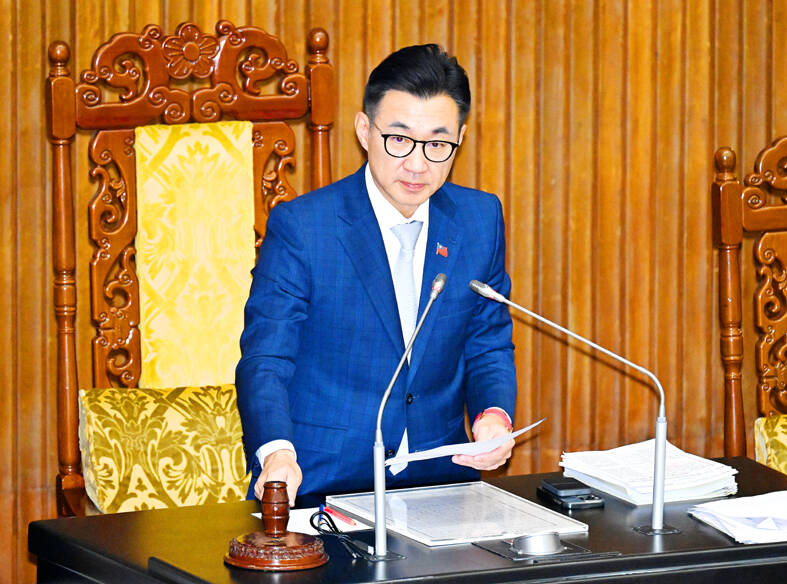The Legislative Yuan yesterday passed a bill on whistle-blower protection that awards employees in government agencies and government-run businesses and groups who inform the public of unethical acts.
The bill’s first iteration at a meeting of the legislature’s Judiciary and Organic Laws and Statutes Committee on Nov. 7 was initially named the draft whistle-blower protection act, but the name came under discussion based on whether it would apply to the public sector, the private sector, or both.
The legislature yesterday voted to adopt an amended Chinese Nationalist Party (KMT) version of the bill, which says that the act would only apply to government agencies and state-owned businesses.

Photo: Liao Chen-huei, Taipei Times
The Act Protecting Anti-corruption Informants (公益揭弊者保護法案) says that the Ministry of Justice would have jurisdiction over its implementation and that it should establish a Whistle-blower Protection Committee staffed by seven members and chaired by the Minister of Justice.
The bill defines whistle-blowers as public servants or employees at state-owned corporations who report unethical acts and are willing to go on record as the individual reporting the act.
The bill also defines unethical acts as acts and behavior that would contravene Chapter 4 of the Criminal Code, the Anti-Corruption Act (貪污治罪條例), sections under the Act on Recusal of Public Servants Due to Conflicts of Interest (公職人員利益衝突迴避法) in which the civil servant would be fined, the Judges Act (法官法), the Trade Secrets Act (營業秘密法), the Money Laundering Control Act (洗錢防制法) and the Anti-Infiltration Act (反滲透法).
The bill defines relevant agencies or individuals to whom whistle-blowers should report unethical acts as the supervisors or heads of government agencies; the supervisor or manager of a state-owned business; businesses, groups and agencies controlled by the government; the judiciary or the police; the competent authorities under which the whistle-blower works; the Control Yuan; or other government ethics departments.
The bill says that retaliatory measures against whistle-blowers — their dismissal, removal from office, denying their rights and benefits in terms of promotions, or reassigning them to jobs or locations that would be detrimental — are banned.
Those retaliating against whistle-blowers would be punished according to the Civil Servants Penal Act (公務員懲戒法) and the Civil Servants Performance Evaluation Act (公務人員考績法), the bill says.
People who are not civil servants leaking the name of a whistle-blower without cause would face up to one year in prison and a fine of up to NT$100,000, it says.
Additional reporting by CNA

CHAOS: Iranians took to the streets playing celebratory music after reports of Khamenei’s death on Saturday, while mourners also gathered in Tehran yesterday Iranian Supreme Leader Ayatollah Ali Khamenei was killed in a major attack on Iran launched by Israel and the US, throwing the future of the Islamic republic into doubt and raising the risk of regional instability. Iranian state television and the state-run IRNA news agency announced the 86-year-old’s death early yesterday. US President Donald Trump said it gave Iranians their “greatest chance” to “take back” their country. The announcements came after a joint US and Israeli aerial bombardment that targeted Iranian military and governmental sites. Trump said the “heavy and pinpoint bombing” would continue through the week or as long

TRUST: The KMT said it respected the US’ timing and considerations, and hoped it would continue to honor its commitments to helping Taiwan bolster its defenses and deterrence US President Donald Trump is delaying a multibillion-dollar arms sale to Taiwan to ensure his visit to Beijing is successful, a New York Times report said. The weapons sales package has stalled in the US Department of State, the report said, citing US officials it did not identify. The White House has told agencies not to push forward ahead of Trump’s meeting with Chinese President Xi Jinping (習近平), it said. The two last month held a phone call to discuss trade and geopolitical flashpoints ahead of the summit. Xi raised the Taiwan issue and urged the US to handle arms sales to

A magnitude 5.6 earthquake struck off the coast of Yilan County at 12:37pm today, with clear shaking felt across much of northern Taiwan. There were no immediate reports of damage. The epicenter of the quake was 16.9km east-southeast of Yilan County Hall offshore at a depth of 66.8km, Central Weather Administration (CWA) data showed. The maximum intensity registered at a 4 in Yilan County’s Nanao Township (南澳) on Taiwan’s seven-tier scale. Other parts of Yilan, as well as certain areas of Hualien County, Taipei, New Taipei City, Taoyuan, Hsinchu County, Taichung and Miaoli County, recorded intensities of 3. Residents of Yilan County and Taipei received

Taiwan has secured another breakthrough in fruit exports, with jujubes, dragon fruit and lychees approved for shipment to the EU, the Ministry of Agriculture said yesterday. The Animal and Plant Health Inspection Agency on Thursday received formal notification of the approval from the EU, the ministry said, adding that the decision was expected to expand Taiwanese fruit producers’ access to high-end European markets. Taiwan exported 126 tonnes of lychees last year, valued at US$1.48 million, with Japan accounting for 102 tonnes. Other export destinations included New Zealand, Hong Kong, the US and Australia, ministry data showed. Jujube exports totaled 103 tonnes, valued at